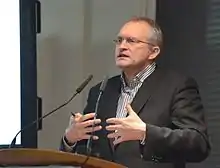Christoph M. Schmidt
Christoph Matthias Schmidt (born 25 August 1962) is a German economist. He is the president of the RWI Essen and since 2009 chairman of the German Council of Economic Experts. He is also a professor at the University of Bochum. His field of interest is Applied Econometrics, particularly in the context of Labor Economics and Energy Economics.
Christoph M. Schmidt | |
|---|---|
 Christoph M. Schmidt | |
| Born | 25 August 1962 |
| Nationality | Germany |
| Institution | RWI Essen |
| Field | Econometrics Labor economics |
| Alma mater | Ludwig Maximilian University of Munich Princeton University University of Mannheim |
| Doctoral advisor | David Card |
| Information at IDEAS / RePEc | |
Early life and education
Schmidt received his Diplom in Economics at the University of Mannheim in 1987, and his M.A. in Economics from Princeton University in 1989. He also earned his PhD from Princeton in 1991, under supervision of David Card. Schmidt received his Habilitation in 1995 from Ludwig Maximilian University of Munich.
Career
In 2002, Schmidt became president of the RWI - Leibniz Institute for Economic Research and in 2009 he replaced Bert Rürup on the German Council of Economic Experts (GCEE) advising the German government. Since March 2013, he has been chairman of the GCEE.[1] In 2014, he became member of the Steering Committee of the German Academy of Science and Engineering (acatech).
Schmidt was co-editor of the Journal of Population Economics and the German Economic Review. His research has been published in journals like the European Economic Review, the Journal of Economic Behavior and Organization, the Journal of Health Economics, the Journal of Public Economics, and the Review of Economics and Statistics.[2]
In April 2020, Schmidt was appointed by Minister-President Armin Laschet of North Rhine-Westphalia to a 12-member expert group to advise on economic and social consequences of the COVID-19 pandemic in Germany.[3]
Other activities
Corporate boards
- IKB Deutsche Industriebank, Member of the Advisory Board[4]
Non-profit organizations
- Fritz Thyssen Foundation, Member of the Scientific Advisory Board[5]
- Wirtschaftsdienst, Member of the Scientific Advisory Board[6]
- German Academy of Science and Engineering, Member of the Presidium (since 2014)
- Alfried Krupp von Bohlen und Halbach Foundation, Member of the Board of Trustees
- Jackstädt Center for Entrepreneurship and Innovation Research, Member of the Advisory Board (since 2013)[7]
- Max Planck Institute for Tax Law and Public Finance, Chairman of the Board of Trustees (since 2013)[8]
- Kinderstiftung Essen, Member of the Board of Trustees[9]
Recognition
Schmidt was awarded the Princeton University Fellowship (1987–1990), the Alfred P. Sloan Doctoral Dissertation Fellowship (1990–1991) and a scholarship for his Habilitation from the Deutsche Forschungsgemeinschaft (DFG; English: German Research Foundation) (1992–1995).[10]
Selected publications
- Bauer, Thomas K.; Bender, Stefan; Paloyo, Alfredo R.; ——— (2015). "Evaluating the labor-market effects of compulsory military service". European Economic Review. 56 (4): 814–829. doi:10.1016/j.euroecorev.2012.02.002. hdl:10419/35864.
- Bauer, Thomas K.; Bender, Stefan; Paloyo, Alfredo R.; ——— (2014). "Do Guns Displace Books? The Impact of Compulsory Military Service on Educational Attainment". Economics Letters. 124 (3): 313–515. doi:10.1016/j.econlet.2014.07.026. hdl:10419/61364. S2CID 185892.
- Frondel, Manuel; ——— (2014). "A Measure of a Nation's Physical Energy Supply Risk". The Quarterly Review of Economics and Finance. 54 (2): 208–215. doi:10.1016/j.qref.2013.10.003. hdl:2003/31104.
- Bauer, Thomas K.; Breidenbach, Philipp; Paloyo, Alfredo R.; ——— (2012). ""Phantom of the Opera" or "Sex and the City" - Historical Amenities as Sources of Exogenous Variation". Labour Economics. 37: 93–98. doi:10.1016/j.labeco.2015.05.005. hdl:10419/103319. S2CID 18095163.
- Bauer, Thomas K.; Kluve, Jochen; Schaffner, Sandra; ——— (2009). "Fiscal Effects of Minimum Wages: An Analysis for Germany" (PDF). German Economic Review. 10 (2): 224–242. doi:10.1111/j.1468-0475.2009.00467.x. S2CID 53407727.
References
- http://en.rwi-essen.de/schmidt/lebenslauf/
- http://en.rwi-essen.de/schmidt/lebenslauf/
- Kristian Frigelj (April 1, 2020), Zwölfköpfiges Gremium: Armin Laschet gründet „Expertenrat Corona“ Die Welt.
- Members of the Advisory Board IKB Deutsche Industriebank.
- Scientific Advisory Board Fritz Thyssen Foundation.
- Scientific Advisory Board Wirtschaftsdienst.
- Members of the Advisory Board Archived 13 April 2016 at the Wayback Machine University of Wuppertal.
- Members of the Board of Trustees Max Planck Institute for Tax Law and Public Finance.
- Members of the Board of Trustees Kinderstiftung Essen.
- http://en.rwi-essen.de/schmidt/lebenslauf/